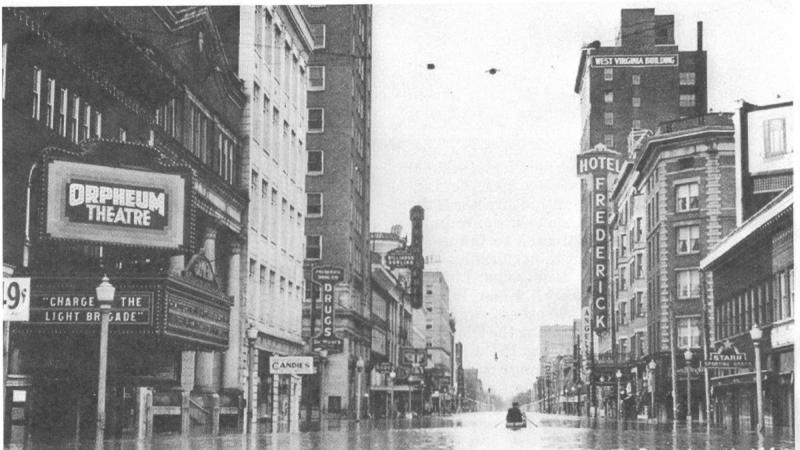
------------------------------------------------------------------------------------------------------

------------------------------------------------------------------------------------------------------
The Orpheum Theater was one of many 4th, Avenue businesses
inundated by the 1937 flood.
Note the rowboat making its way down the middle of the flooded avenue.
------------------------------------------------------------------------------------------------------
HUNTINGTON -- In September of 1915, workers began tearing
down the houses located next door to the Huntington Elks Lodge
on downtown 4th
Avenue. Prominent local businessman C. Lloyd Ritter told The Herald-Dispatch
he planned to use the site for construction of either a movie theater or a
three-story office building.
A few weeks later, the newspaper reported that Ritter had
decided to build a theater. Plans for the new 1,600-seat theater,
Ritter said,
had been drawn up by well-known Huntington architect Verus T. Ritter.
Ritter said the theater would be leased to a group of
Cincinnati businessmen who owned a number of other theaters.
The new $75,000
theater would be named Orpheum, he said, and would be affiliated with that
chain of movie theaters and vaudeville houses.
Although intended primarily as
a movie theater, the Orpheum's stage was large enough to accommodate even the
largest productions, he said.
The Orpheum opened March 20, 1916, with a showing of
"Peggy," a movie with Broadway actress Billie Burke in her first film role.
As
was the custom at the time, a live orchestra provided music to accompany the
movie. "PREMIERE OF THE OREPHEUM BIG SUCCESS,"
headlined The Herald-Dispatch
the next morning.
In March of 1917, the Hyman family took over the Orpheum
lease. At that time, the Hymans already controlled
two other Huntington
theaters, the Lyric and the Dixie. They would go on to buy or build a number
of
other Huntington theaters, including the grand Keith-Albee, which opened in
1928.
As the film business changed, the Orpheum was renamed the
Cinema and subdivided into four small theaters.
But one by one, declining
business forced the Hyman family to close its Huntington theaters.
The former
Orpheum closed its doors for the last time in 2011. Today, Crew Church
worships at the old theater.
-----------------------------------------------------------
Note: This Article and picture appeared in the
Herald-Dispatch Newspaper on Dec. 28 , 2015.
Note: The picture that was used was the Courtesy of the U.S Army Corps of
Engineers.
-----------------------------------------------------------
[ Back ]